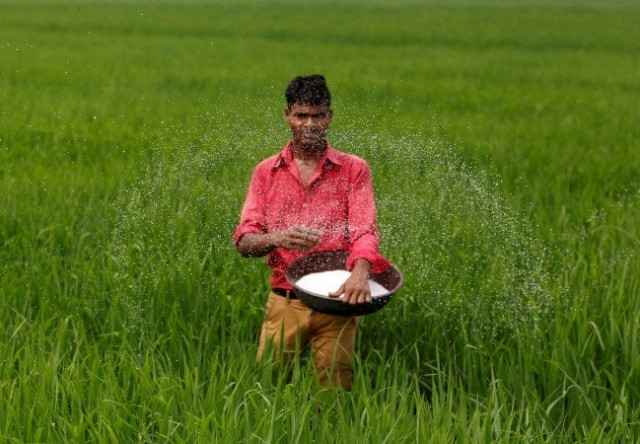Agrarian dilemma: Is the smart subsidy really smart for Pakistani farmers?
Fertiliser manufactures propose idea of introducing smart subsidy for welfare of small-scale farmers

A farmer spreads fertiliser in his rice field. PHOTO: REUTERS
According to Engro Fertilisers’ Chief Financial Officer Imran Ahmed, introducing smart or targeted subsidy is the answer to Pakistan’s growing food insecurity. Unlike the current subsidy offered by the government on the urea produced from imported Re-gasified Liquefied Natural Gas (RLNG), he believes that smart or targeted subsidy has the potential to elevate the livelihood of Pakistanis and ensure food security with affordable prices for millions of people as well as small-scale farmers.
Data provided by fertiliser manufacturers in the country reveals that approximately 90% of the farmers in Pakistan own less than 12.5 acres of land and have access to only 45% of cultivated area, out of which 65% of small scale farmers own less than five acres of land. However, 10% of rich landlords claim more than 50% of the country’s agricultural land, leaving the remaining 90% of farmers limited to small-scale holdings.
Fresh initiative to boost agriculture
Hence, fertiliser manufacturers like Ahmed believe that the current form of subsidy selectively favours large-scale farmers whose agricultural income is untaxed, all the while neglecting small-scale and subsistence farmers, who form the majority of Pakistan’s agricultural sector. This highlights the need for a targeted subsidy to empower the majority of small-scale farmers in the country.
However, farmer representatives dismissing the opinions of the fertiliser sector believe that the current method of subsidy is far more beneficial for them as compared to the proposed idea of a smart subsidy and rather demanded an increase in the current model.
According to President Farmers Bureau Pakistan (FBP) Zafar Hayat, the government will have to continue providing subsidy to both, small and large scale farmers for the agriculture sector to prosper.
“Not providing subsidy to 20% of large-scale landlords would mean ignoring about 80% of the country’s agricultural land,” he told The Express Tribune. “The proposal to implement smart subsidy is useless, as it potentially will hurt rather than benefit Pakistan’s agriculture sector as a whole.”
On the other hand, the fertiliser manufacturers have maintained that the area being prepared from imported RLNG is unserviceable to the farmers and has only been stocked in excess. They believe that if the same efforts were invested in providing subsidy to small-scale farmers with less than five acres of landholding, they would have had the chance of obtaining urea for free.
Farmer turns Punjab’s sand dunes green
“Only 25% of the annual subsidy and cost would’ve been required to run an RLNG based plant and import urea, in order to reduce the price of urea by Rs500 per bag, for small-scale farmers,” said a fertiliser manufacturer.
According to manufacturers, such a targeted subsidy would not only benefit farmers with small landholdings but can also balance the use of fertiliser in the country.
For instance, the Punjab government’s targeted subsidy scheme reaped plenty in profit by directly providing phosphorous and potassium-based fertiliser to small-scale farmers.
Using Punjab government’s initiative as a reference, fertiliser manufacturers believe the current method of subsidy could be further developed to be more effective.
“The mechanism should mandatorily be stake based so that it can be brought into action through a web portal, like Punjab government’s model. Subsidy amount should be transferred directly into pockets of the small-scale farmers using their unique CNIC numbers”
Punjab Director General for Expanding Agriculture Dr Muhammad Anjum opined that the price of fertilisers must be reduced in order to ease the burden of agricultural cost on the farmers.
“The Punjab government, along with providing fertilisers to farmers is also taking several other steps to ensure the development of the agricultural sector,” he concluded.
Published in The Express Tribune, November 6th, 2019.



















COMMENTS
Comments are moderated and generally will be posted if they are on-topic and not abusive.
For more information, please see our Comments FAQ